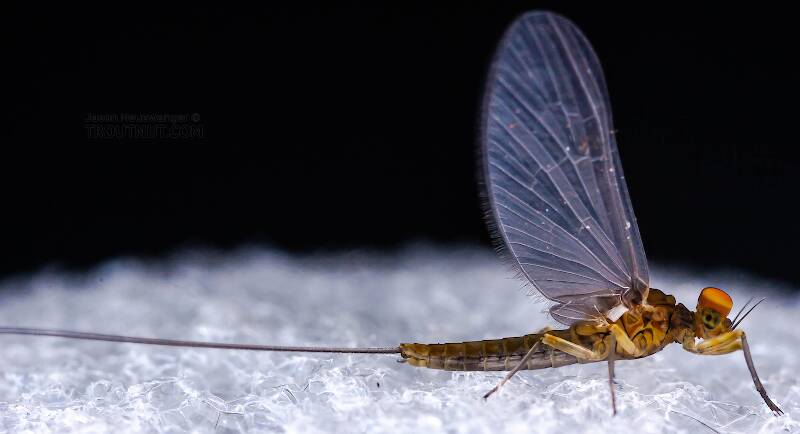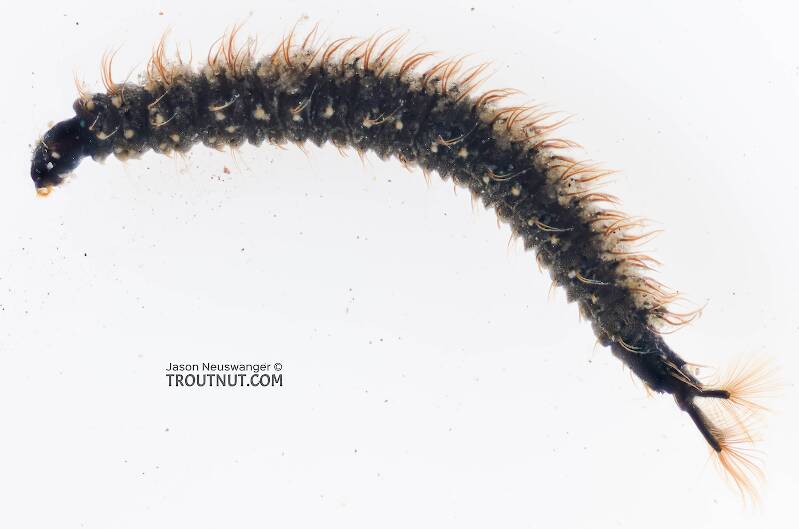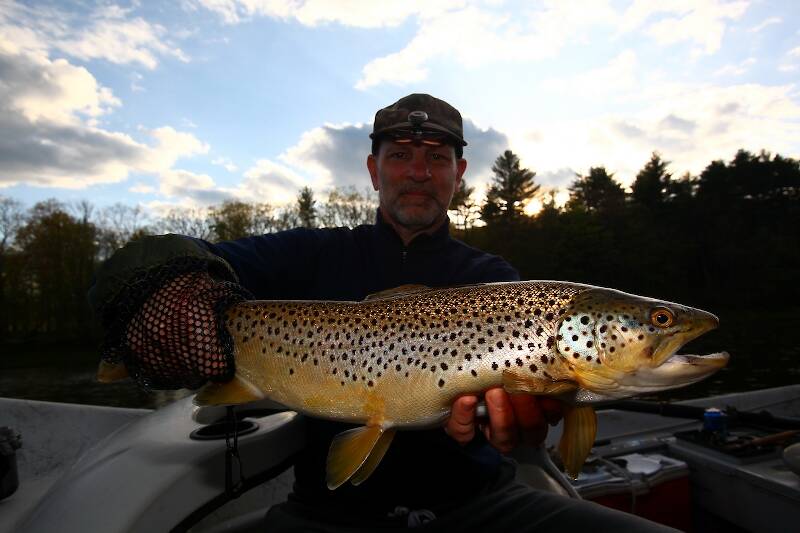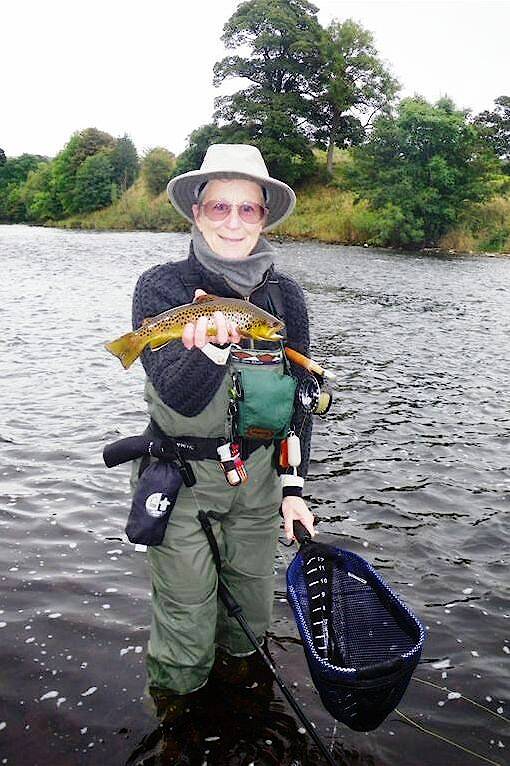
Blue-winged Olives
Baetis
Tiny Baetis mayflies are perhaps the most commonly encountered and imitated by anglers on all American trout streams due to their great abundance, widespread distribution, and trout-friendly emergence habits.
Featured on the forum

This wild-looking little thing completely puzzled me. At first I was thinking beetle or month larva, until I got a look at the pictures on the computer screen. I made a couple of incorrect guesses before entomologist Greg Courtney pointed me in the right direction with Psychodidae. He suggested a possible genus of Thornburghiella, but could not rule out some other members of the tribe Pericomini.

Troutnut is a project started in 2003 by salmonid ecologist Jason "Troutnut" Neuswanger to help anglers and
fly tyers unabashedly embrace the entomological side of the sport. Learn more about Troutnut or
support the project for an enhanced experience here.
Martinlf on Jan 2, 2007January 2nd, 2007, 12:32 am EST
No this is not beating a dead horse; it is resurrecting one still nagging some of us.
As I recall, we had a bit of fun with the Latin pronunciation thread, championing the idea of common usage to justify our pronunciation of baetis, and taking Caesar's name in vain. However, we did not come up with any consistent key to ennunciating those long polysyllables naming our exoskeletoned friends.
Recently surfing Jason's photos in an attempt to identify some nymphs, I stopped at the Family Heptageniidae and realized that the pronunciation of the double i had me flummoxed, so I did a bit of Googling. The result was the following website:
http://www.ai.uga.edu/mc/latinpro.pdf
This site not only tells why the ae in baetis should always be pronounced as the a in plate, but also why we pronounce the ae in Caesar with the sound of e in beet, a seeming inconsistency. For anyone who has tended to mumble his or her bug Latin, or to cough as it was pronounced, this site will give you new confidence. It does appear that I'll have to abandon my beloved pronunciation of the feminine plural -ae as the i in time, except, or course, when reciting Catullus.
As I recall, we had a bit of fun with the Latin pronunciation thread, championing the idea of common usage to justify our pronunciation of baetis, and taking Caesar's name in vain. However, we did not come up with any consistent key to ennunciating those long polysyllables naming our exoskeletoned friends.
Recently surfing Jason's photos in an attempt to identify some nymphs, I stopped at the Family Heptageniidae and realized that the pronunciation of the double i had me flummoxed, so I did a bit of Googling. The result was the following website:
http://www.ai.uga.edu/mc/latinpro.pdf
This site not only tells why the ae in baetis should always be pronounced as the a in plate, but also why we pronounce the ae in Caesar with the sound of e in beet, a seeming inconsistency. For anyone who has tended to mumble his or her bug Latin, or to cough as it was pronounced, this site will give you new confidence. It does appear that I'll have to abandon my beloved pronunciation of the feminine plural -ae as the i in time, except, or course, when reciting Catullus.
"He spread them a yard and a half. 'And every one that got away is this big.'"
--Fred Chappell
--Fred Chappell
Martinlf on Jan 3, 2007January 3rd, 2007, 11:42 am EST
This is an interesting site, Roger. I must admit that if I spelled it the way the site does, I would have a hard time pronuncing the ae in anaemia like the a in lake, but then I prefer the Anglicized spelling and pronunciation, anemia, which solves the problem for me. Aether and foetus are similar cases, but I'll concede that amoeba gives me a problem. I do prefer the spelling and the pronunciaton on your site for this word. And I do pronounce phoenix with the ee (as in beet) sound, again because of well-established usage. Vertibrae,though, presents an interesting example for me, as I've most often heard the ae that ends it pronounced like the a in lake, and I prefer that pronunciation. How do you pronounce vertibrae in normal conversation? Also, do you pronounce the ae in baetis like the ee in beet when you're in the fly shop?
While I'll agree that one only needs to find an expert to agree with, I'm still leaning toward Covington, the classicist who provided the site I mentioned. Your site gives a long and short pronunciation for ae, but as far as I can tell it only references the first syllable of words when it provides a rule for which to use. and the other rules seem overly complex. Covington's rules are easier to follow for me, and, at least at this point with his "out" for Anglicized words, they seem to better fit more words that I'm familiar with. Perhaps it's my humanist's bias. I'll be interested to see the comments that follow. Thanks for stirring the pot.
While I'll agree that one only needs to find an expert to agree with, I'm still leaning toward Covington, the classicist who provided the site I mentioned. Your site gives a long and short pronunciation for ae, but as far as I can tell it only references the first syllable of words when it provides a rule for which to use. and the other rules seem overly complex. Covington's rules are easier to follow for me, and, at least at this point with his "out" for Anglicized words, they seem to better fit more words that I'm familiar with. Perhaps it's my humanist's bias. I'll be interested to see the comments that follow. Thanks for stirring the pot.
"He spread them a yard and a half. 'And every one that got away is this big.'"
--Fred Chappell
--Fred Chappell
Taxon on Jan 3, 2007January 3rd, 2007, 3:08 pm EST
Louis-
For a very long time, I've been pronouncing Baetis Bait-iss as per Hatches II. Only in the last several years have I heard that pronunciation called into question, but I have now become convinced that the proper pronunciation is Beet-iss. However, I find it extremely difficult to remember a new pronunciation when the old one slips so easily off my tongue. With regard to "ae" words in common use, I just pronounce them as I hear them pronounced, and don't really concern myself about the rules.
For a very long time, I've been pronouncing Baetis Bait-iss as per Hatches II. Only in the last several years have I heard that pronunciation called into question, but I have now become convinced that the proper pronunciation is Beet-iss. However, I find it extremely difficult to remember a new pronunciation when the old one slips so easily off my tongue. With regard to "ae" words in common use, I just pronounce them as I hear them pronounced, and don't really concern myself about the rules.
Martinlf on Jan 4, 2007January 4th, 2007, 12:21 am EST
Roger, I really like your final solution of pronouncing them as you hear them pronounced and not worrying too much about the rules. When all is said and done that may be the best approach on many topics.
"He spread them a yard and a half. 'And every one that got away is this big.'"
--Fred Chappell
--Fred Chappell
CaseyP on Feb 5, 2007February 5th, 2007, 12:32 pm EST
Louis et al:
went to that site and couldn't really understand much of it beyond the vowels, so i'm asking you folks: how do we properly pronounce Jason's February playmate? its name is Pteronarcys biloba.
how about /tare-oh-NAR-sees bill-OH-bah/
it was my resolution this year to learn some bug names which is why i need to know.
thanks
went to that site and couldn't really understand much of it beyond the vowels, so i'm asking you folks: how do we properly pronounce Jason's February playmate? its name is Pteronarcys biloba.
how about /tare-oh-NAR-sees bill-OH-bah/
it was my resolution this year to learn some bug names which is why i need to know.
thanks
"You can observe a lot by watching." Yogi Berra
Taxon on Feb 5, 2007February 5th, 2007, 1:37 pm EST
Casey-
Hmmm. My guess would be: TAIR-uh-NAR-seez bee-LOH-bah.
Hmmm. My guess would be: TAIR-uh-NAR-seez bee-LOH-bah.
CaseyP on Feb 6, 2007February 6th, 2007, 6:12 am EST
thank you, Roger. sounds good to me.
'nother question: how come the P in front of the t like pterodactyl? We have P in front of n in words to do with breathing and air (pneumonia, pneu meaning tire in French). is P in in front of t something like this in Latin scientific names?
'nother question: how come the P in front of the t like pterodactyl? We have P in front of n in words to do with breathing and air (pneumonia, pneu meaning tire in French). is P in in front of t something like this in Latin scientific names?
"You can observe a lot by watching." Yogi Berra
Taxon on Feb 6, 2007February 6th, 2007, 8:19 am EST
Casey-
Quoting from Pronunciation of Biological Latin by Peter Ommundsen:
Don't have a clue as to why, other than to say, those are among the pronunciation rules that have evolved.
Quoting from Pronunciation of Biological Latin by Peter Ommundsen:
Some initial consonants are silent when followed by a consonant.
pterosaur = "TER-o-saur"
pseudopod = "SOO-do-pod"
pneuma = "NEW-ma"
gnathous = "NATH-ous"
phthegma = "THEG-ma"
chthamalus = "THAM-al-us"
ctenoid = "TEN-oid"
mnium = "NY-um"
tmema = "MEE-ma"
Don't have a clue as to why, other than to say, those are among the pronunciation rules that have evolved.
Troutnut on Feb 12, 2007February 12th, 2007, 8:56 am EST
I'm just glad this is a site about trout fishing and not ptrout pfishing. :)
Jason Neuswanger, Ph.D.
Troutnut and salmonid ecologist
Troutnut and salmonid ecologist
CaseyP on Feb 12, 2007February 12th, 2007, 2:42 pm EST
tsk, tsk, Jason. it's not pfishing, it's ghoti-ing.
(do i detect a little cabin pfever developing on the pforum?)
(do i detect a little cabin pfever developing on the pforum?)
"You can observe a lot by watching." Yogi Berra
Quick Reply
Related Discussions
Topic
Replies
Last Reply
8
Jan 7, 2009
by Dgracia
by Dgracia
41
Mar 20, 2011
by Aaron7_8
by Aaron7_8
7
Jan 19, 2009
by Taxon
by Taxon





